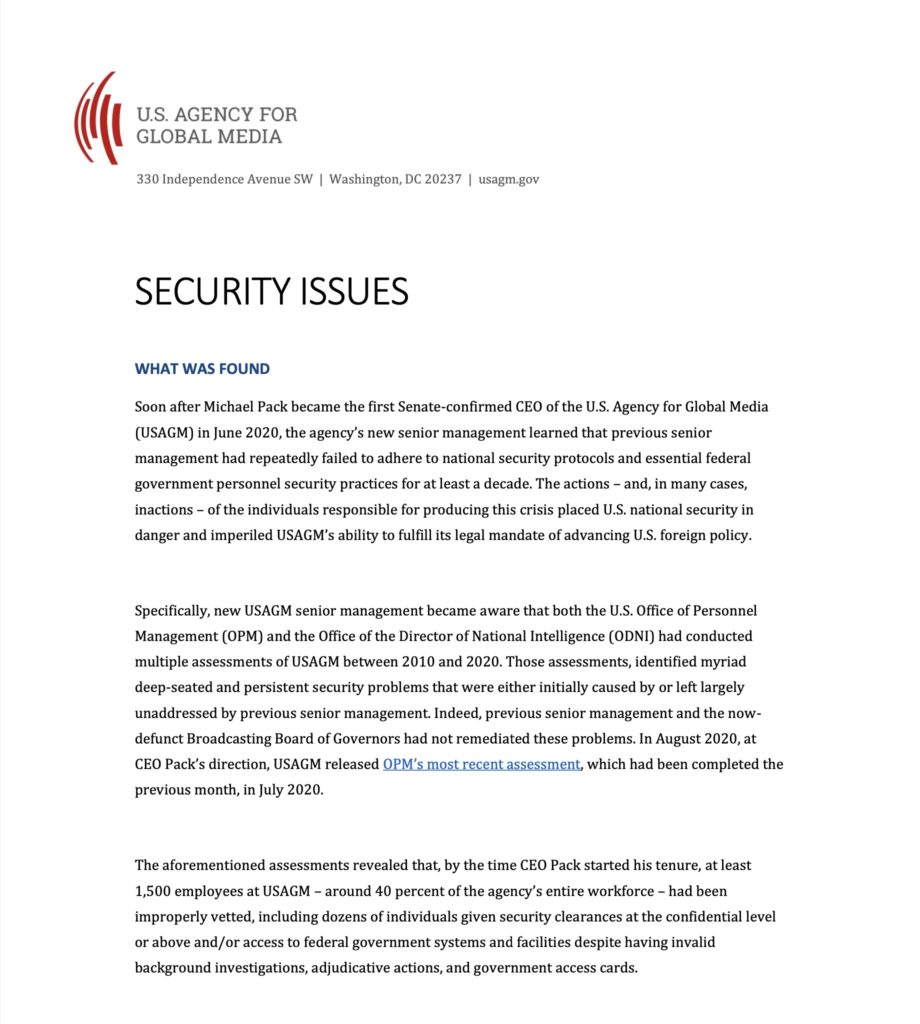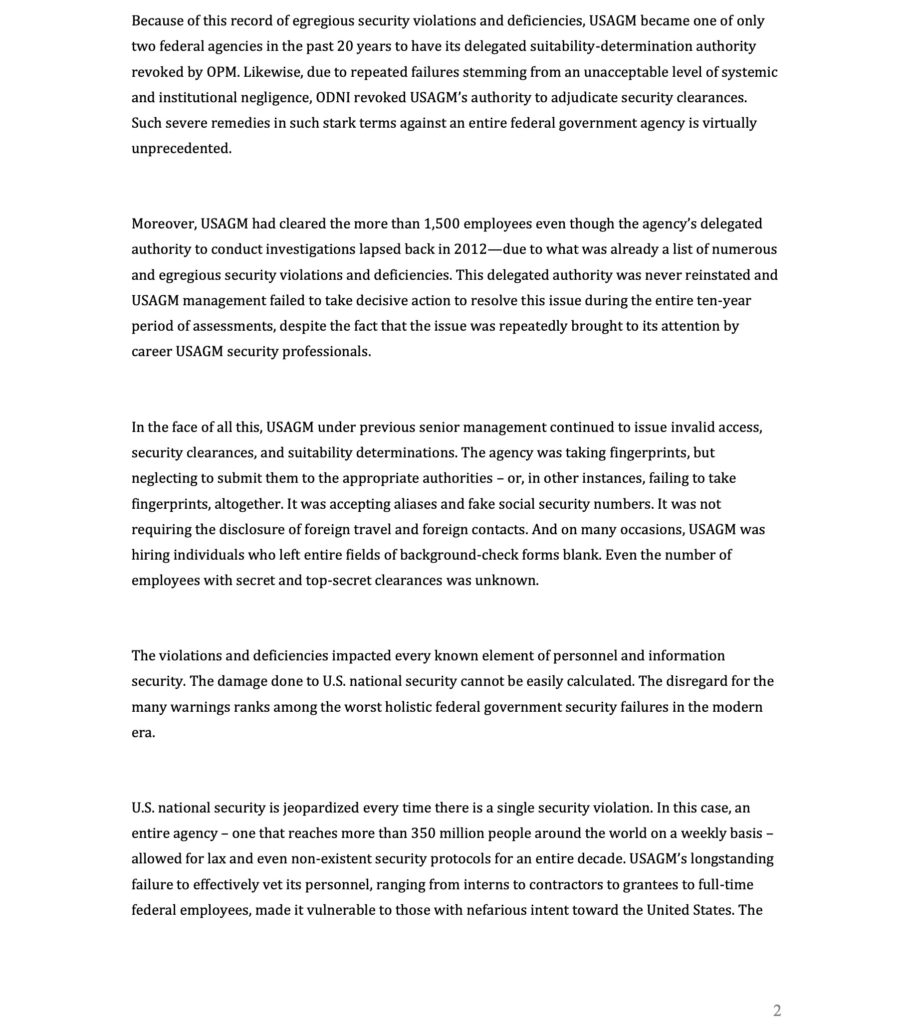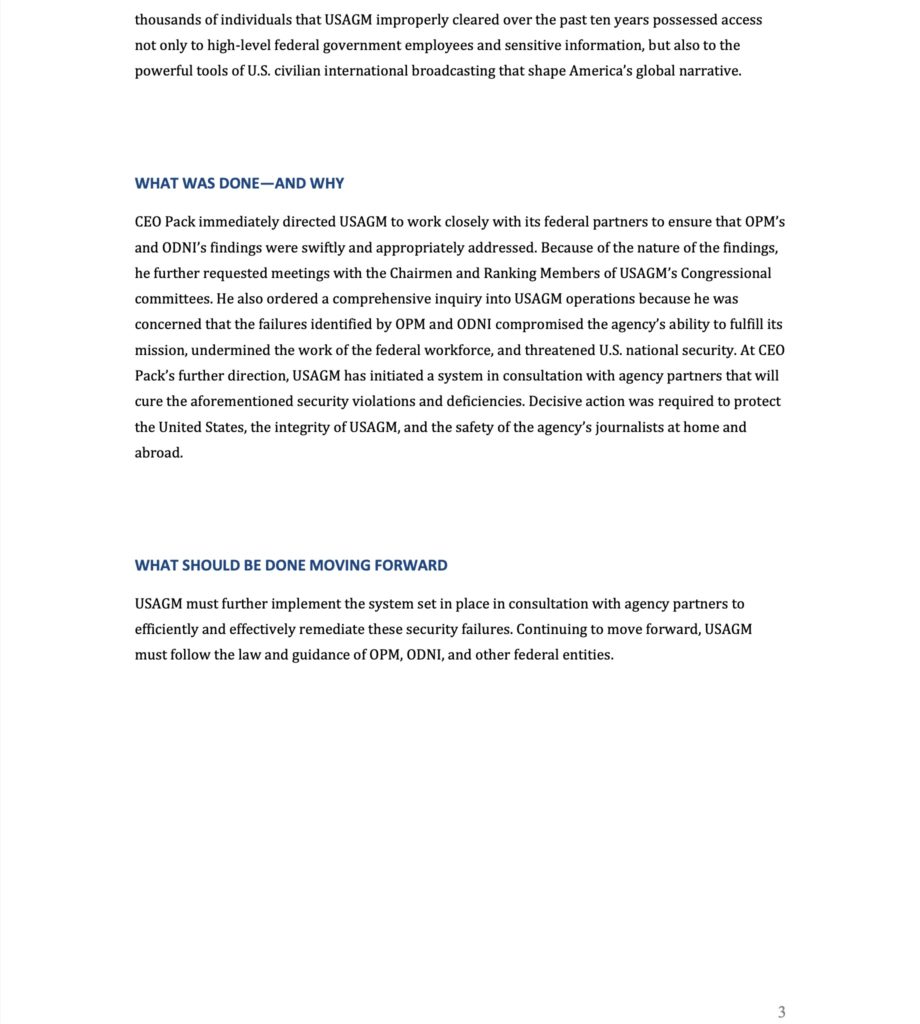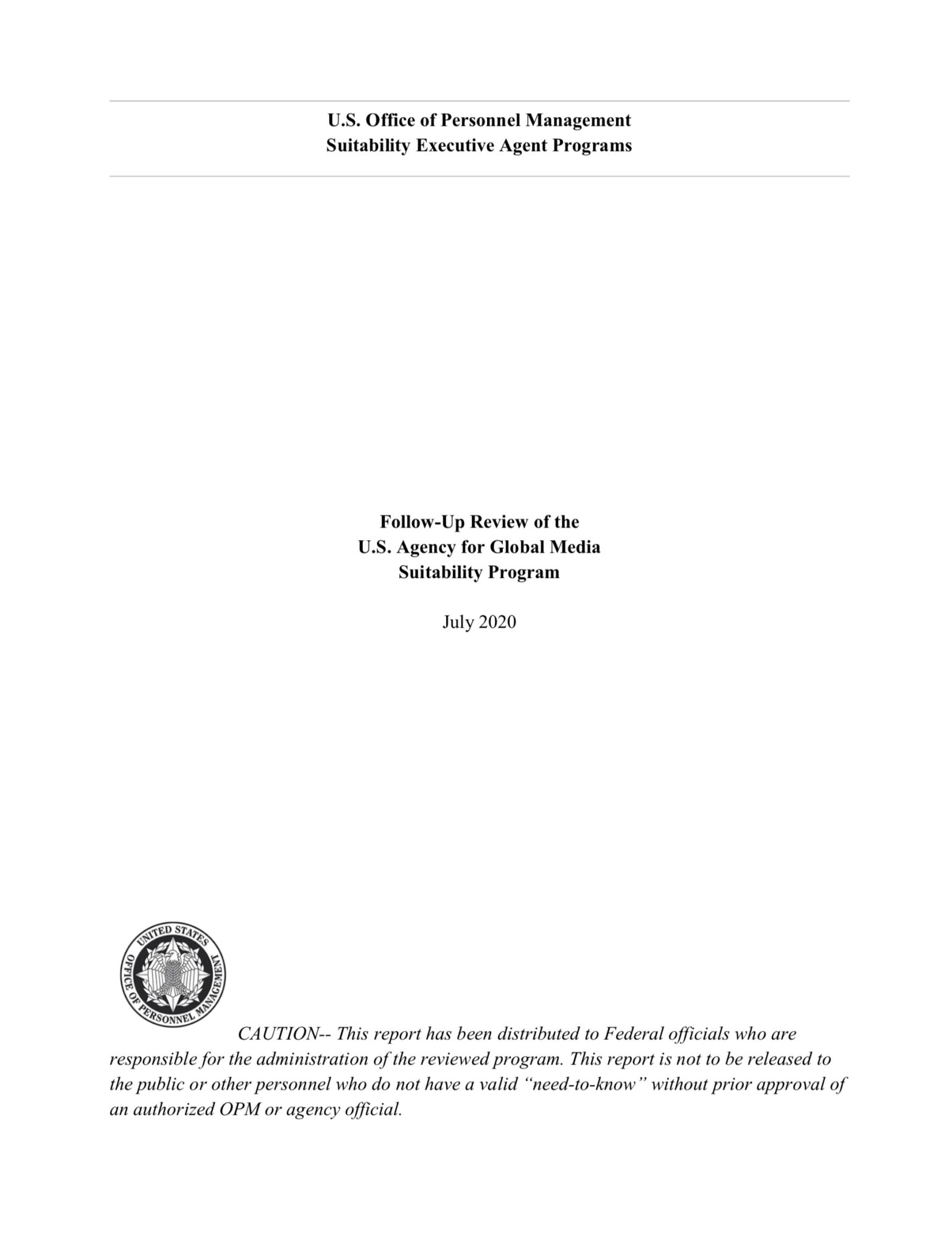Catching Up on USAGM: Biden’s U.S. Agency for Global Media Head Reinstates Executives Suspended by Michael Pack, Criticizes Him and His Appointees
USAGM Watch Commentary
The Hill and other U.S. media reported in late February 2021 that five individuals, described in the article in The Hill as “whistleblowers” and “employees,” were returned to their jobs by Kelu Chao, acting CEO of the U.S. Agency for Global Media (USAGM). President Biden appointed Kelu Chao, a longtime VOA manager, as acting USAGM CEO in January. Trump-appointed CEO Michael Pack suspended the five in August 2020.
The now reinstated managers again occupy senior agency positions. They were responsible for running USAGM during the years when Pack said that he uncovered major management problems, some of them related to security. The five are not rank-and-file employees or working journalists but rather senior staffers who again are running the agency under the overall supervision by Kelu Chao.
[spacing size=”50″]
THE HILL

In an e-mail sent to USAGM staff on February 17, 2021, Kelu Chao wrote:
[spacing size=”50″]
I am beyond pleased to announce that Deputy Director for Operations Matt Walsh, Chief Strategy Officer Shawn Powers, Chief Financial Officer Grant Turner, General Counsel David Kligerman, and Executive Director Oanh Tran have all returned to their positions at the agency. They – along with former colleague Marie Lennon – went to great lengths to try to defend the firewall, which serves as the foundation for USAGM’s nonpartisan mission, including the objective journalism of our networks. I pledge to continue doing everything I can to support the firewall, editorial integrity, and quality journalism.
I’m also pleased to announce that Deputy CFO John Barkhamer has returned to his position at the agency as well. John resigned out of principle during the previous CEO’s tenure. He took a stand for what’s right, as did all of our returning colleagues. I know everyone will join me in extending a warm welcome back to all of them.
[spacing size=”50″]
In an unprecedented public rebuke from a currently serving senior-level U.S. government official and her employee, Kelu Chao and her spokesperson issued a scathing condemnation of Michael Pack and his appointees, some of whom, including Pack, have a record of years of public U.S. government service, including the period of opposing Soviet propaganda during the Cold War. Some of the now private U.S. citizens criticized in the USAGM, U.S. government agency public statement work as independent journalists and broadcasters. Chao’s public criticism of Pack and his appointees was reported in a March 9, 2021 article in Government Executive by Courtney Bublé.
[spacing size=”50″]
GOVERNMENT EXECUTIVE

[spacing size=”50″]
“Former CEO Pack and his appointees damaged the agency’s global credibility, operations, relationships with key interagency stakeholders and grantees, and workforce morale,” Laurie Moy, the agency’s acting director of public affairs, told Government Executive in a statement. “It will take time for the agency to gather the facts of what former CEO Pack did and determine how to properly and legally disentangle them. Acting CEO Kelu Chao is committed to being responsive and transparent to Congress, [offices of inspectors general], and other oversight entities as this process unfolds.”
[spacing size=”50″]
ALSO READ: “Senator Bob Menendez questions USAGM acting CEO’s decision to appoint Sylvia Rosabal as Director of the Office of Cuba Broadcasting,” USAGM Watch, April 9, 2021.
[spacing size=”50″]
USAGM WATCH
[spacing size=”50″]
Michael Pack
[spacing size=”50″]
Former USAGM CEO Michael Pack and his staff made various allegations against managers and executives whom he had suspended. He did not suspend Kelu Chao.
After Biden’s win in November, “Chao, previously Voice of America program director, joined a lawsuit with a group of top officials who were placed on administrative leave in August, then sued the agency alleging Pack interfered with editorial independence and the First Amendment rights of the journalists,” Government Executive and other media outlets reported. A federal judge issued a preliminary injunction in late-November, which prevented Pack from getting involved directly in editorial operations.
Pack claimed that he was addressing management failures rather than trying to influence program content. He described some of the problems as lax security policies, procedures and practices at the agency under the supervision of suspended senior executives.
Pack’s take on the agency’s management under some of these managers as well as his predecessors in top agency and VOA jobs can be glanced partly from an undated position paper written when Pack was still at the helm at USAGM. The USAGM position paper written under Pack said in part:
[spacing size=”25″]
In the face of all this, USAGM under previous senior management continued to issue invalid access, security clearances, and suitability determinations. The agency was taking fingerprints, but neglecting to submit them to the appropriate authorities – or, in other instances, failing to take fingerprints, altogether. It was accepting aliases and fake social security numbers. It was not requiring the disclosure of foreign travel and foreign contacts. And on many occasions, USAGM was hiring individuals who left entire fields of background-check forms blank. Even the number of employees with secret and top-secret clearances was unknown.
[spacing size=”25″]
U.S. AGENCY FOR GLOBAL MEDIA



330 Independence Avenue SW | Washington, DC 20237 |
[Undated Position Paper – written during Michael Pack’s tenure as USAGM CEO]
SECURITY ISSUES
WHAT WAS FOUND
Soon after Michael Pack became the first Senate-confirmed CEO of the U.S. Agency for Global Media (USAGM) in June 2020, the agency’s new senior management learned that previous senior management had repeatedly failed to adhere to national security protocols and essential federal government personnel security practices for at least a decade. The actions – and, in many cases, inactions – of the individuals responsible for producing this crisis placed U.S. national security in danger and imperiled USAGM’s ability to fulfill its legal mandate of advancing U.S. foreign policy.
Specifically, new USAGM senior management became aware that both the U.S. Office of Personnel Management (OPM) and the Office of the Director of National Intelligence (ODNI) had conducted multiple assessments of USAGM between 2010 and 2020. Those assessments, identified myriad deep-seated and persistent security problems that were either initially caused by or left largely unaddressed by previous senior management. Indeed, previous senior management and the now- defunct Broadcasting Board of Governors had not remediated these problems. In August 2020, at CEO Pack’s direction, USAGM released OPM’s most recent assessment, which had been completed the previous month, in July 2020.
The aforementioned assessments revealed that, by the time CEO Pack started his tenure, at least 1,500 employees at USAGM – around 40 percent of the agency’s entire workforce – had been improperly vetted, including dozens of individuals given security clearances at the confidential level or above and/or access to federal government systems and facilities despite having invalid background investigations, adjudicative actions, and government access cards.
Because of this record of egregious security violations and deficiencies, USAGM became one of only two federal agencies in the past 20 years to have its delegated suitability-determination authority revoked by OPM. Likewise, due to repeated failures stemming from an unacceptable level of systemic and institutional negligence, ODNI revoked USAGM’s authority to adjudicate security clearances. Such severe remedies in such stark terms against an entire federal government agency is virtually unprecedented.
Moreover, USAGM had cleared the more than 1,500 employees even though the agency’s delegated authority to conduct investigations lapsed back in 2012—due to what was already a list of numerous and egregious security violations and deficiencies. This delegated authority was never reinstated and USAGM management failed to take decisive action to resolve this issue during the entire ten-year period of assessments, despite the fact that the issue was repeatedly brought to its attention by career USAGM security professionals.
In the face of all this, USAGM under previous senior management continued to issue invalid access, security clearances, and suitability determinations. The agency was taking fingerprints, but neglecting to submit them to the appropriate authorities – or, in other instances, failing to take fingerprints, altogether. It was accepting aliases and fake social security numbers. It was not requiring the disclosure of foreign travel and foreign contacts. And on many occasions, USAGM was hiring individuals who left entire fields of background-check forms blank. Even the number of employees with secret and top-secret clearances was unknown.
The violations and deficiencies impacted every known element of personnel and information security. The damage done to U.S. national security cannot be easily calculated. The disregard for the many warnings ranks among the worst holistic federal government security failures in the modern era.
U.S. national security is jeopardized every time there is a single security violation. In this case, an entire agency – one that reaches more than 350 million people around the world on a weekly basis – allowed for lax and even non-existent security protocols for an entire decade. USAGM’s longstanding failure to effectively vet its personnel, ranging from interns to contractors to grantees to full-time federal employees, made it vulnerable to those with nefarious intent toward the United States. The thousands of individuals that USAGM improperly cleared over the past ten years possessed access not only to high-level federal government employees and sensitive information, but also to the powerful tools of U.S. civilian international broadcasting that shape America’s global narrative.
WHAT WAS DONE—AND WHY
CEO Pack immediately directed USAGM to work closely with its federal partners to ensure that OPM’s and ODNI’s findings were swiftly and appropriately addressed. Because of the nature of the findings, he further requested meetings with the Chairmen and Ranking Members of USAGM’s Congressional committees. He also ordered a comprehensive inquiry into USAGM operations because he was concerned that the failures identified by OPM and ODNI compromised the agency’s ability to fulfill its mission, undermined the work of the federal workforce, and threatened U.S. national security. At CEO Pack’s further direction, USAGM has initiated a system in consultation with agency partners that will cure the aforementioned security violations and deficiencies. Decisive action was required to protect the United States, the integrity of USAGM, and the safety of the agency’s journalists at home and abroad.
WHAT SHOULD BE DONE MOVING FORWARD
USAGM must further implement the system set in place in consultation with agency partners to efficiently and effectively remediate these security failures. Continuing to move forward, USAGM must follow the law and guidance of OPM, ODNI, and other federal entities.
END OF USAGM SECURITY ISSUES Michael Pack POSITION PAPER
[spacing size=”50″]
USAGM Watch Commentary
VOA and USAGM Under Amanda Bennett and John Lansing
“Significant problems have befallen the agency since CEO Michael Pack arrived and I have deep concerns about the trajectory USAGM is on,” Turner, one of the whistleblowers, said in September 2020 testimony at an oversight hearing held by the House Foreign Affairs Committee, the article in The Hill noted.
“I know many of you share these concerns. Like you, I am worried about the credibility and the goodwill of our networks being destroyed. It has taken literally decades to build this trust with our audiences. Tragically, it can be destroyed far more quickly,” Grant Turner warned the lawmakers.
But according to some of the former VOA journalists writing for USAGM Watch, credibility of at least the Voice of America was seriously undermined between 2016 and 2020, with multiple violations of the VOA Charter reported when Amanda Bennett, who was VOA Director before the arrival of Pack, and Kelu Chao were in charge of VOA, and multiple management scandals reported when John Lansing and Grant Turner were in charge of the agency’s overall operations. They claim that they had dealt with any problems quickly and effectively and were not themselves responsible for any programming or management failures. A top aide to John Lansing at USAGM was convicted of stealing money from the agency and served time in a federal prison.
A press release on the USAGM official website, dated August 4, 2020, announced that Michael Pack released a report by the U.S. Office of Personnel Management’s (OPM) Suitability Executive Agent Programs. The press release said that the report “reveals severe and systemic security failures at the agency, many of which have persisted for years.” The position paper written at USAGM under Pack said about the former management that “disregard for the many warnings ranks among the worst holistic federal government security failures in the modern era.” The USAGM and VOA managers who were in charge dispute such characterizations of their performance and in turn criticize Pack.
[spacing size=”50″]
CEO Pack releases OPM report detailing long-standing USAGM security failures
WASHINGTON, D.C. — U.S. Agency for Global Media (USAGM) CEO Michael Pack has released a report that reveals severe and systemic security failures at the agency, many of which have persisted for years. This latest report was produced by the U.S. Office of Personnel Management’s (OPM) Suitability Executive Agent Programs, which conducts program reviews of Executive Branch agencies’ personnel suitability and vetting programs.
[spacing size=”50″]


